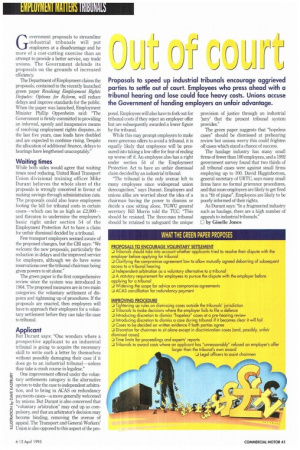G overnment proposals to streamline industrial tribunals will put employees at
Page 43

If you've noticed an error in this article please click here to report it so we can fix it.
a disadvantage and be more of a cost-cutting exercise than an attempt to provide a better service, say trade unions. The Government defends its proposals on the grounds of increased efficiency.
The Department of Employment claims the proposals, contained in the recently launched green paper Resolving Employment Rights Disputes: Options for Reform, will reduce delays and improve standards for the public. When the paper was launched, Employment Minister Phillip Oppenheim said: "The Government is firmly committed to providing an informal, speedy and inexpensive means of resolving employment rights disput&s...in the last five years, case loads have doubled and are expected to continue rising. Despite the allocation of additional finance, delays to hearings have lengthened unacceptably."
Waiting times
While both sides would agree that waiting times need reducing, United Road Transport Union divisional training officer Mike Durant believes the whole slant of the proposals is wrongly conceived in favour of making savings through administration cuts. The proposals could also leave employees footing the bill for tribunal costs in certain cases—which can be as high as £2,000— and threaten to undermine the employee's basic right under section 54 of the Employment Protection Act to have a claim for unfair dismissal decided by a tribunal.
Few transport employers seemed aware of the proposed changes, but the CBI says: "We welcome the new proposals, particularly the reduction in delays and the improved service for employers, although we do have some reservations over the tribunal chairman being given powers to sit alone."
The green paper is the first comprehensive review since the system was introduced in 1964. The proposed measures are in two main categories: the voluntary settlement of disputes and tightening up of procedures. If the proposals are enacted, then employees will have to approach their employers for a voluntary settlement before they can take the case to tribunal.
Applicant
But Durant says: "One wonders where a prospective applicant to an industrial tribunal is going to acquire the necessary skill to write such a letter by themselves without possibly damaging their case if it does go to an industrial tribunal—unless thay take a crash course in legalese."
One improvement offered under the voluntary settlements category is the alternative option to take the case to independent arbitration, and to bring in ACAS on redundancy payments cases—a move generally welcomed by unions. But Durant is also concerned that "voluntary arbitration" may end up as compulsory, and that an arbitrator's decision may become binding, removing the avenue of appeal. The Transport and General Workers' Union is also opposed to this aspect of the pro posal. Employees will also have to fork out for tribunal costs if they reject an employer offer but are subsequently awarded a lower figure by the tribunal.
While this may prompt employers to make more generous offers to avoid a tribunal, it is equally likely that employees will be pressured into taking a low offer for fear of ending up worse off if. An employee also has a right under section 54 of the Employment Protection Act to have an unfair dismissal claim decided by an industrial tribunal.
"The tribunal is the only avenue left to many employees since widespread union derecognition," says Durant. Employers and unions alike are worried about the idea of a chairman having the power to dismiss or decide a case sitting alone. TGWU general secretary Bill Morris told the TUC: "This should be resisted. The three-man tribunal should be retained to safeguard the unique provision of justice through an industrial 'jury' that the present tribunal system provides."
The green paper suggests that "hopeless cases" should be dismissed at prehearing review but unions worry this could frighten off cases which stand a chance of success.
The haulage industry has many small firms of fewer than 100 employees, and a 1992 government survey found that two thirds of all tribunal cases were against small firms employing up to 100. David Higginbottom, general secretary of URTU, says many small firms have no formal grievance procedures, and that more employees are likely to get fired in a "fit of pique". Employees are likely to be poorly informed of their rights.
As Durant says: "In a fragmented industry such as haulage, there are a high number of appeals to industrial tribunals."
0 by Giselle Jones




























































































